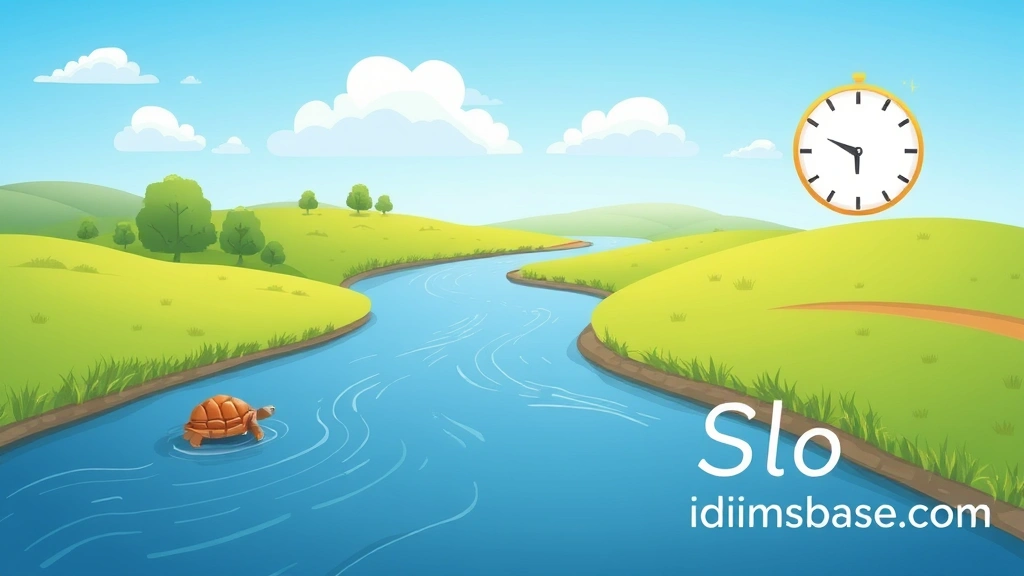Have you ever tried to describe something moving at a snail's pace, but felt your words just weren't quite hitting the mark? Perhaps you've been stuck in traffic that felt like it was going backwards, or witnessed a project unfold with agonizing slowness. Sometimes, "slow" just isn't descriptive enough, is it?
That's where the magic of similes comes in! Similes are those wonderful literary tools that compare two unlike things using "like" or "as," bringing vivid imagery and deeper understanding to our language. They allow you to paint a picture with words, making your descriptions more engaging and memorable.
Today, we're diving into a treasure trove of ways to describe "slow." Whether you're a writer looking for the perfect phrase, a student trying to spice up your essays, or just someone who loves the English language, you're in for a treat! Let's explore 40 fantastic similes for slow that will elevate your vocabulary and make your descriptions truly shine.
Similes for Slow: A Comprehensive List
Get ready to expand your descriptive toolkit! Here are 40 brilliant similes that capture every nuance of "slow."
- As slow as molasses in January: A classic! Imagine thick, sticky molasses barely moving in the cold.
- As slow as a snail: The quintessential image of slowness, known for its deliberate, unhurried pace.
- As slow as a tortoise: Similar to a snail, a tortoise is synonymous with a long, drawn-out journey.
- As slow as a sloth: These arboreal creatures define leisurely movement.
- As slow as continental drift: A geological process that happens over millions of years – truly glacial!
- As slow as a dripping faucet: Each drop takes its time, making for a prolonged process.
- As slow as paint drying: A common idiom for something incredibly tedious and unhurried.
- As slow as watching grass grow: Another popular phrase for something that seems to take forever.
- As slow as a week in jail: Time seems to crawl when you're counting the minutes.
- As slow as cold honey: Like molasses, honey thickens and moves sluggishly when chilled.
- As slow as a funeral procession: A somber, dignified pace where haste is inappropriate.
- As slow as a developing photograph: The image slowly, gradually appears, much like old film.
- As slow as a melting glacier: Massive, powerful, yet incredibly slow in its movement.
- As slow as a slug: Another garden dweller known for its unhurried glide.
- As slow as a broken clock: It doesn't move at all, or only very rarely.
- As slow as rush hour traffic: The irony! "Rush" hour often means barely moving.
- As slow as treacle: A British term for a thick, dark syrup, much like molasses.
- As slow as a ponderous elephant: Although large, elephants often move with a deliberate, unhurried gait.
- As slow as a tired old man: Reflecting the natural slowing down that comes with age.
- As slow as a sleepy river: A calm river flows gently, without any urgency.
- As slow as a heavily loaded wagon: The weight makes every movement a struggle.
- As slow as a bogged-down tractor: Stuck in mud, it can barely move.
- As slow as a limping dog: Injured, it can only move with great difficulty and pain.
- As slow as a creaking door: Old and stiff, it opens and closes with effort.
- As slow as a dawning day: The sun rises gradually, light spreading slowly.
- As slow as a winding river: Its path is long and meandering, not direct.
- As slow as a hesitant decision: Taking a long time to make up one's mind.
- As slow as a cautious cat: When stalking prey or exploring new territory, cats can be incredibly deliberate.
- As slow as a heavy sigh: The breath escapes slowly, indicating weariness or resignation.
- As slow as a clock without batteries: It simply stops.
- As slow as a sinking ship: A gradual, inevitable descent.
- As slow as a fading memory: Memories can slip away little by little over time.
- As slow as a growing child: Changes happen incrementally, day by day.
- As slow as a blooming flower: The petals unfurl gently over time.
- As slow as a simmering pot: The heat builds gradually, not intensely.
- As slow as a lazy summer afternoon: Time seems to stretch out endlessly.
- As slow as a dreaming mind: Thoughts drift without urgency or direction.
- As slow as a caterpillar's crawl: Every segment moves with careful deliberation.
- As slow as a long goodbye: A farewell that stretches on, full of lingering emotion.
- As slow as waiting for a watched pot to boil: The classic adage reminding us that perceived time can feel longer.
Key Takeaways
- Similes make descriptions vivid: They transform a simple "slow" into a rich, imaginative phrase.
- Context is key: The best simile depends on what you're trying to describe and the feeling you want to convey.
- Practice makes perfect: The more you use similes, the more natural they'll become in your writing and speech.
- Creativity is encouraged: Don't be afraid to invent your own similes!

Frequently Asked Questions (FAQs)
Q1: What is the difference between a simile and a metaphor?
A simile explicitly compares two different things using "like" or "as." For example, "He eats like a pig." A metaphor, on the other hand, directly states that one thing is another, implying the comparison without "like" or "as." For example, "He is a pig" (meaning he eats a lot). Metaphors are a bit more direct and often more forceful.
Q2: Why are similes important in writing?

Similes are incredibly important because they add depth, imagery, and emotion to your writing. They help readers visualize what you're describing, make abstract concepts more relatable, and make your language more engaging and memorable. They can also reveal character, set a mood, or even add humor.
Q3: Can I create my own similes?
Absolutely! In fact, some of the most powerful and original writing comes from creating unique similes. To create your own, think about the quality you want to describe (like "slow") and then brainstorm things that embody that quality in an interesting or unexpected way. Then, connect them using "like" or "as." For example, if you want to describe a slow internet connection, you might say, "The internet was as slow as a tortoise wading through treacle."
Q4: How can I remember these similes?
The best way to remember similes is to use them! Try incorporating one or two of these into your daily conversations, emails, or creative writing. Reading widely and paying attention to how other authors use similes can also help them stick in your mind. You can also try visualizing the simile – really imagine molasses dripping in January – to make it more memorable.
Q5: Are there any common mistakes people make when using similes?
One common mistake is using clichés too often. While "as slow as a snail" is widely understood, overusing common similes can make your writing less original. Another mistake is making comparisons that don't quite fit or are confusing. The two things being compared should have a clear, understandable connection. Also, avoid forcing similes into your writing; they should feel natural and enhance the text, not interrupt it.
We hope this list has given you a newfound appreciation for the many ways to describe "slow." Go forth and make your language as vibrant and engaging as possible!






